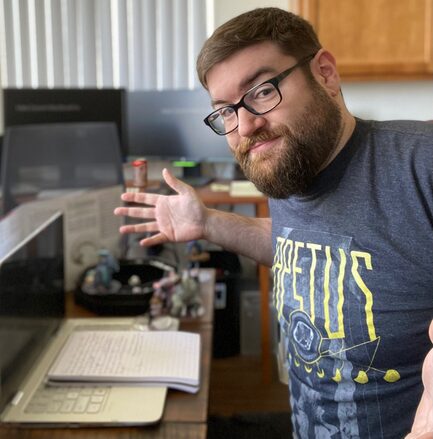5 Tips On Writing: With Matthew Cerami
Hello! My name is Matt Cerami – I’ve been in the games industry as Writer & Narrative Designer for 5+ years, and have worked as a Narrative Director, Lead Writer, and Senior Writer on Mobile, Indie, and AAA projects.
I specialize in Horror, Dark Fantasy, and Sci-Fi but can (and have) written for projects of all stripes and kinds! I have also been published as a poet, lyricist, journalist, and prose-fiction writer – and have Bachelor’s Degrees in English Literature and Philosophy.
Hooking Your Audience
The Inciting Incident: Nothing can make or break audience investment more than the Inciting Incident – this is the catalyst, the fuel, the incentive, and the motivation for both your characters and your audience. It should happen early, it should be explosive, it should shake the world, and it should force engagement with the plot by virtue of its sheer unavoidability. It should be mysterious, enticing – unexplained – something that demands further investigation. Neither your characters nor your audience will be hooked by the mundane, the easily understood, or the quickly overcome.
Make it personal, too. The audience is always going to identify with the main characters, so the plot – and the Inciting Incident – should happen to the main characters, and not simply around them. Unavoidable is, again, the operative word. The more directly your characters are affected, derailed, challenged, or opposed, the more investment you’re sure to garner from an audience, who have no choice now but to empathize with and problem-solve alongside the protagonists.
Imagine a character – a woman (Mary), carrying groceries back to her car. She drops an orange. She sighs – the audience sighs – neither party is affected by this, and both continue about their day. Now imagine the same woman, except on approach to her car she notices a masked man stabbing out the tires – then, from behind, another man on a motorcycle skids to a violent stop, screaming “grab the orange! It has to be the orange – the one with the sticker!” The tire-stab man grabs the whole bag of groceries, and snatches Mary’s purse, too. The two men speed away. Now Mary is stranded in a parking lot, without her money, phone, or ID, in a head-on confrontation with the plot. She has to act, we’ve left her no choice. Are you there with her? Just what is the deal with that orange – and what will she do next?
Mastering Plot Development
Outline: Don’t leave anything to chance – construct a scaffold for your story from beginning to end, and map out every beat. This will not only allow you to hone each plot point to a precision-point of excitement and impact, but it also allows you to foreshadow, seed themes, and build cohesion, ensuring that every plot beat will enhance those that come both before and after.
Drip-Feed: Resolve little (or nothing). Drip-feed just enough information per beat to maintain forward momentum – intrigue, allure, and direction – but nothing more. Every answer should come paired with a new question – every solution should come paired with a new problem. Never let your story become idle or aimless. There should always be a clear goal. Build a perpetual cycle of tension and release until the resolution. Force your characters to keep pushing forward by virtue of necessity; at no point should an audience (or player) feel it reasonable to ask: “Why would they do that? Why wouldn’t they just go home right now?”
Character-Centric: Never waste a good plot point! Every new beat should be reflected in the characters – an advance in the story should be paired with an advance in their development, for better or worse. Don’t let your characters escape a plot beat unscathed! Reinforce the plot – give it gravitas – through the reactions of your characters. If your characters don’t care about something, your audience won’t, either. An audience will look to your characters to gauge the magnitude of whatever has just occurred.

Effective World-Building Strategies
The Genre Fantasy: Think about what your audience expects from your genre of choice – if you’re writing a Dark Fantasy, they might expect evil mages, savage demons, arcane rituals, and war-ravaged lands. If you’re writing a Western, they might expect legendary gunslingers, no-nonsense barkeeps, and romantic, sun-scorched tales of revenge. Whether you’re looking to subvert genre tropes or reiterate them, audience expectations (yours included!) are a good place to start. Fill your world with things that are expected of it – then twist them until they are uniquely your own.
Logical Consistency: If you’re writing in a made-up world, it has to make sense – there have to be discernible rules, boundaries, patterns, and systems of logic that are consistently applied, regardless of the fantastical absurdity of the context, and even if they’re never explicitly spoken aloud. Nothing shatters audience immersion quicker than a world that has no internal rules – where a villain has new powers in every scene, or portals work just how they need to for any moment at hand. The real world has rules – that is our default way of operating – so if you want audience buy-in, your made-up world will need rules, too.
Atmosphere & The Unexplained: Don’t over-explain your world! This is particularly true if you’re writing a place that is far detached from our own – an alien society on an extraterrestrial world, or an inter-dimensional plane of existence. The mystery is what makes it alive. The idiosyncrasies, atmospheres, unexplained phenomena – things that the characters understand, but the audience doesn’t – this is how worlds come to life; when the audience can imagine a world persisting with or without their engagement; a world that, we imagine, continues its machinations even after we’ve put down the book, or turned off the screen. Dune, Lord of the Rings, Harry Potter, Elden Ring – all excellent modern examples of this.
Techniques for Character Development
Expose The Core: Put your characters in situations that expose them to their core – put them in dilemmas that are unavoidable, circumstances that they can’t hide from – give them problems that cannot be solved by any simple measure of decorum or tact, take away their comforts and usual tools. Strip away all layers of pretense, and don’t be afraid of big reactions. An audience rarely tunes in to watch characters respond in calm, reasonable, or healthy ways – write flaws, mistakes, regrets, bravado, and ignorance.
Permanence: If something dramatic happens to your character – let it change them, and stick with the change! A character shouldn’t overcome deep trauma in a handful of scenes – let it affect the way they talk, move, think, interact. Likewise, a character who’s learned to live a healthier life shouldn’t be so easily tempted back into the dark. The building up and breaking down of characters – the constant tension between where they’ve been, who they are, and where they’re going – is a conflict ripe for storytelling. Let changes simmer, and don’t be quick to undo them one way or another.
Subtext: What a person says can reveal a lot about them – but what they don’t say, or avoid saying, can reveal even more. Don’t have your characters express outright what they’re feeling. Experiment with obfuscation, moments of silence, an awkward glance, a shuffle of the feet, a tension that saturates the air. Are they saying what they mean? What’s being said between the lines or in moments of silence? Some modern games – The Last of Us II, God of War (2018), Red Dead Redemption 2 – have mastered the art of developing characters through subtext, stoicism, and silence.
Crafting Meaningful Decisions
Size Matters: With regards to games, my tip for creating meaningful choices is to actually make them meaningful – meaning they have a notable and significant effect on the player’s experience of the game. However, in order to do this, I believe games need to get smaller. There is no budget or technology that can currently produce a 300-hour, open-world RPG with meaningful choices, and a vast, branching narrative – it simply is not possible (yet). The potentialities and variables in the player experience are too much to account for, and so freedom of choice must be restrained, often to an unsatisfactory degree.
A game with small, isolated locations, mandatory golden-path set-pieces, hand-crafted NPCs, and a tightly-controlled, linear story actually allows for a much greater depth of narrative choice and consequence than the alternative (see: early Bioware games). Meaningful choice in video games is (currently) only achievable when the variables are manageable and controlled; though it seems counterintuitive, restraint in game size actually allows for an enormity of narrative and player freedom.

Matthew's Work & Experience
Most recently, I’ve worked on an unannounced AAA rogue-like shooter – though I’ve also worked on cozy indie games like One Lonely Outpost, and mobile IPs like Final Fantasy XV: A New Empire, and Crystalborne: Heroes of Fate. I’m also in the process of writing a sci-fi horror novel about things that go terribly awry on a doomed generation ship (that’s carrying human cargo to another world).
Writing & Narrative Design Skills
I’d like to think my strengths are in scenework, dialogue, worldbuilding, and iteration! I also have a knack for cross-department collaboration, and have worked closely with artists, musicians, voice actors, game designers, and animators to align and enhance the totality of any given narrative experience.
Exploring Favorites
My obsession with storytelling started with my exposure to Lord of the Rings and, later, Stephen King’s Dark Tower series – so they deserve a shout-out – and the Mass Effect trilogy is certainly in the running, as well!
A Wish for Interactive Audio Stories
Sci-Fi and Horror are my jams, so converting something like Dead Space or Returnal into an interactive audio story – replete with creepy ambience, orchestra stings, and monster SFX – would be a dream. Anything about isolated astronauts encountering some Lovecraftian, mind-shattering alien horror!
Register for our Free Writing Workshop now!
If you are interested in creating your own interactive audio story, you can apply for our free webinar! It will introduce you to our interactive story game engine, TWIST, and teach you how to use it to create interactive audio stories.
Interested in contributing to our blog series?
If you would also like to publish a blog post on our website and share your own story with interested readers, simply fill out the contact form.





